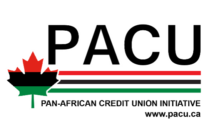Pan-African Credit Union Initiative
About Pan-African Credit Union Initiative
The Pan-African Credit Union is an initiative of The Jamaican Canadian Association and The Lions Circle African Canadian Men’s Association.
The objective of this initiative is to establish an alternate banking option steeped in co-operative economics, to better serve black Ontarians within the Greater Toronto Region and beyond.
According to the National Credit Union Association of the United States, “minority-owned and managed credit unions play a critical role in providing financial services to communities that have been traditionally underserved or unbanked.”
In addition to providing financial services to individuals and businesses within the black communities in Ontario, the creation of the Pan-African Credit Union (PACU) will provide financial education on topics, such as, budgeting, credit usage, credit management, financial investment and wealth-building.
PACU is committed to serving individuals and families from the Black Community, as well as, Black-owned businesses, with the overarching objective of inspiring tangible economic growth and inter-generational wealth within the Black Community.
MILESTONE: Pan-African Credit Union (PACU) Initiative has submitted credit union application
to governing body for approval
Reaching the submission stage of the credit union application process is a milestone for the PACU Steering Committee. For due diligence purposes, the credit union application package was reviewed by KPMG Chartered Accountants prior to the application submission.
Now that the application package has been submitted, the PACU Initiative Steering Committee will begin rolling out various initiatives and campaigns to support capitalization of the future credit union – via investment pledging, sponsorship and donations. Our goal is to raise $15M. With your help, we can do this.
If you have any questions, please contact invest@pacu.ca
Frequently Asked Questions (FAQs)
The Pan-African Credit Union is a collaborative initiative, formed by The Jamaican Canadian Association, The Lion’s Circle Afrikan Men’s Association, and the Canadian Black Chamber of Commerce. The PACU Steering Group has set the goal of creating a financial institution that will assist in providing resources that will empower you to move from your current financial situation to where you aspire to be in the future.
Personal products will include savings, chequing, loans and GICs. Business products will also be provided. The recently completed survey will assist the PACU Steering Group in determining other services that are needed. PACU services will also include financial education on topics from budgeting to wealth-building.
Membership is ownership. When you join PACU, you join a group of members with a like-minded focus on building financial growth and sharing in the benefits of collective ownership. With a keen understanding of our complex cultural experience, as a PACU member you will:
- Develop financial growth strategies for you and your family;
- Get preferential lending rates;
- Improve your financial literacy;
- Benefit from business advisory services;
- Be eligible to vote at the Annual General Meeting (AGM)
- A vote impacts how the credit union operates and how the profits are reinvested
- Be eligible to elect Directors for the Board
- Have a voice in the credit union’s support for cultural, educational, charitable and recreational activities in Black communities; and
- Contribute to the larger goal of unification and upliftment of Black communities.
While you do not need to be a member to qualify for a loan, you do need to be a member to have a deposit account and thus be able to fully participate in the membership benefits.
Once the credit union is officially open, you can download an application from the website. Once completed, it can be submitted in-person or by mail.
No. However, proper identification will be required.
PACU will outreach to young people through social media and school/campus events. Please contact us if you would like to assist.
PACU must follow the ‘5Cs’ of banking when qualifying members for a loan: character, capacity, capital, collateral, and conditions. With that said we will offer innovative financial products and financial literacy education to assist clients in making their investment and borrowing dreams come true.
The Deposit Insurance Corporation of Ontario (DICO) is an Ontario Provincial Agency established under the Credit Unions and Caisses Populaires Act, 1994. DICO’s role is to protect depositors of Ontario credit unions and ‘caisses populaires’ from loss of their deposits. Deposit insurance is part of a comprehensive depositor protection program for all Ontario credit unions which is backed by provincial legislation. DICO insures deposits up to $250,000.
PACU will learn from the experiences of successful and unsuccessful credit unions. PACU will adopt and implement the best practices of financial institutions. Management and operational benchmarks may also be set higher than regulatory standards. Most importantly we will partner with and listen to the wants and needs of our owners, which is you, our members.
Currently, our resources are focused on completing a Feasibility Study and Business Plan. While we don’t want to spread out our current resources which are focused on business planning too thin, if we are able to get community assistance, we may be able to organize financial planning events sooner.

PACU Initiative Newsletter Sign Up
You will be kept up to date on the development of this Initiative.

CONTACT
info@pacu.ca
HELP US SPREAD THE WORD
communications@pacu.ca
PACU INFO SESSIONS WEBINAR ACCESS
To watch the PACU info session webinar, please provide your details and we will email you the link.
For more information
Contact:
info@pacu.ca
Volunteer
outreach@pacu.ca
Help us spread the word!
This link takes you to the Jamaican Canadian Association’s tax deductible donor link to help pay startup expenses for the PACU Initiative.


